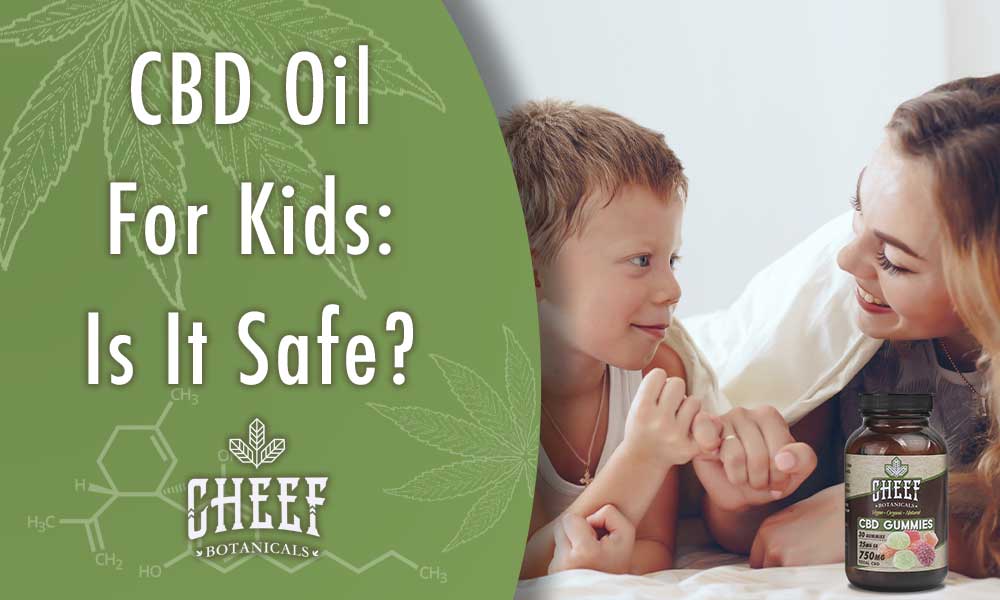With so much talk about CBD news going around, people are trying it out for themselves and experiencing its variety of effects. But, have you ever wondered if CBD oil is safe for kids? Children are sometimes born with debilitating conditions that can greatly reduce their quality of life. Although parents may be using CBD oil to help their kids remain calm, focused, and relaxed, is it really safe for kids?


What Exactly is CBD?
You might have heard about CBD and its benefits but didn't quite catch all the details. Cannabidiol (CBD) is a compound derived from the hemp plant, known for its distinctive properties. Each day, millions of people enhance their lives with CBD flower, thanks to its remarkable potential to promote health, alleviate anxiety, and support overall balance. CBD is a cannabinoid, which is a type of molecule that interacts very well with the human endocannabinoid system (ECS). The ECS is a biological system present in all mammals, including humans. It is composed of receptors that interact with cannabinoids, such as cannabidiol. The ECS is a system that regulates the body’s own natural endocannabinoids. This includes regulating a variety of physiological processes such as inflammation, stress, sleep, and digestion, to name a few. But what really makes CBD special is its ability to work with no intoxicating effects. Unlike tetrahydrocannabinol (THC), CBD is non-psychoactive and therefore does not get you high, no matter how much you consume. THC, on the other hand, does get you high. These two compounds are typically confused with each other, and, as a result, make people skeptical about CBD.
Why Would Kids Need CBD Oil?
In short, CBD has not yet been approved by the FDA to prevent, treat, or cure any diseases or ailments. Therefore, it is recommended that you speak with your pediatrician before considering CBD for your child. What we can confirm, however, is that CBD interacts with the ECS. The ECS plays a vital role in regulating several functions within the body. For example, Dravet syndrome begins at infancy and causes frequent seizures that can last hours. Other serious issues, such as chronic infection, developmental delays, sleeping problems, and sensory integration disorders can follow as Dravet syndrome progresses. Fortunately, there is strong evidence for the ECS's ability to control symptoms due to its influence on neural networks that control our vital functions. Children with autism are also likely to develop behavioral disorders and communication problems. Because the ECS communicates with various brain regions, it may be able to increase signaling activity and stimulate the brain areas associated with these problems. Anxiety and depression are also some of the common disorders that can affect children. Usually, they can lead to problems with sleep and emotions. However, the ECS can influence serotonin and dopamine activity, two neurotransmitters involved in anxiety and depression. These interactions may improve negative emotions and increase calmness within the body.Is CBD Oil Safe for Kids?
CBD oil is generally considered safe for kids. It is non-toxic and non-psychoactive, meaning it will definitely not get your child "high". Of course, it is most important to make sure the product you use contains CBD from hemp, which contains 0.3% THC or less. This ensures that it will not produce a high. It is also important to make sure the CBD you get is the best quality you can find because it will be more potent and cost-effective. CBD is highly valuable for its uses, without any major side effects. While CBD has a few minimal side effects, it is extremely rare to experience them. Drowsiness can occur if too much CBD is consumed at once; however, it is nearly impossible to overdose on CBD. While it is unlikely to experience side effects, they may occur when initially using CBD. After that, side effects should not be noticeable.CBD Oil Dosage for Children
The recommended dosage for regular strength is 0.25 milligrams of CBD oil per 1 pound of bodyweight. For a stronger dose, the recommended amount is 0.50 milligrams of CBD oil per 1 pound of bodyweight. For example, for a child who weighs 60 pounds, a regular strength dose would be (60 lbs x 0.25 mg =) 15 milligrams of CBD oil. This translates to 15 drops for a 300 mg tincture. You may note that a smaller dose used more often is effective, or that a larger dose used once or twice daily works best. Ultimately, you will learn what works best. For more information regarding personal dosage check out our interactive CBD dosing chart.
What Types of CBD are Available for Kids?
- Cheef's Premium CBD capsules - A clean and convenient way to take regular doses of CBD, capsules are effective but take a bit longer to have an effect due to the digestive and metabolic processes that are involved.
- CBD oil tinctures - Some kids may not be able to comfortably swallow capsules, in which case CBD can be taken sublingually in the form of oil tinctures. This is a faster way of absorbing CBD because it bypasses the main digestive system goes into the blood relatively quickly. Effects may be seen within minutes after taking the dosage.
- CBD edibles - Edibles, such as gummy bears, can be a tasty alternative to those who prefer not to swallow capsules. For kids, it’s just like eating candy. Edibles do, however, require a longer time to be absorbed into the bloodstream because of the digestive and metabolic processes involved. It may take anywhere from twenty minutes to an hour for edibles to have an effect on the body, depending on when their last meal was. CBD edibles are most effective on an empty stomach.
Related: CBD And COVID: Can Cannabidiol Prevent Coronavirus?



 CBD Gummies - Top Seller
CBD Gummies - Top Seller
 CBD + THC Gummy - Excellent Choice
CBD + THC Gummy - Excellent Choice
 CBD Hemp Flower - Highly Rated
CBD Hemp Flower - Highly Rated
 Full Spectrum CBD Oil - Good Value
Full Spectrum CBD Oil - Good Value



Leave a comment
This site is protected by hCaptcha and the hCaptcha Privacy Policy and Terms of Service apply.